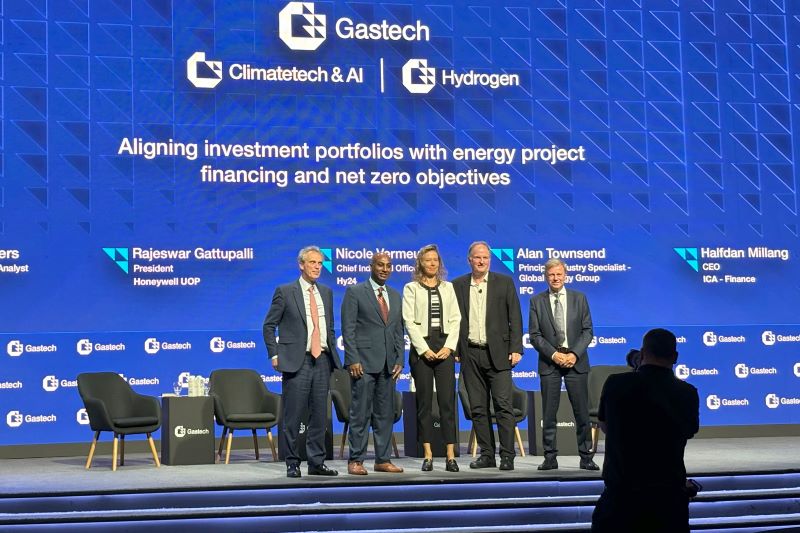
For investors, bankability is dependent on guarantees in the form of licenses and the money that comes in from offtakers. (Source: Shutterstock)
Hitting net-zero emission goals will involve a number of gears working in tandem, including the development of new technologies and the combined use of hydrocarbons and renewables. But, when it comes to proposed projects attracting the necessary capital influxes, the industry is falling short.
Governments in North America and Europe are stepping in to get projects off the ground with incentives such as the Biden administration’s Inflation Reduction Act. However, with the legislation’s tax incentives still unsolidified, shaky politics are not a strong foundation for investors to confidently commit.
The problem is not a shortage of capital available for investment, but a shortage of quality projects combining both low carbon output and affordability, said Alan Townsend, principal industry specialist at investment institution International Finance Corp., in a panel discussion at Gastech Houston in September.

“What we find is, ideas for projects meet the Paris Alignment criteria, but they don't meet bankability criteria,” Townsend said.
There’s a lot that goes into what Townsend called the bankability equation. Sustainability is a big part of a reliable project, but so are sponsors, committed offtakers and supportive policies and regulations, he said. For investors, bankability is dependent on guarantees in the form of licenses and the money that comes in from offtakers.
And, governments need to be committed to contractual stability, Townsend said. “Even if there's a lot of reform to be done in the sector, and that's going to happen in parallel, we need to insulate a project from the worst dysfunctions in the sector.”
There is not enough concessional financing to move the needle on renewable energy projects in emerging markets, Townsend said.
“It's not there in the volume that we need, and that situation is probably not going to get better for us,” he said.
For some of these projects, the capital intensity is so high that making a return investment is really difficult, said Rajesh Gattupalli, Honeywell UOP president. Somebody else has to pay the price, whether that’s the consumer or the government.
Until costs can come down for renewable project development, policy support will continue to be needed, Townsend said. And, policymakers have to prioritize economical solutions, he said.
“Some of the climate ambitions—like whether it's eliminating gas flaring, whether it's moving to a hydrogen economy—they’re not financeable in the market economy,” Townsend said. “They do need some policy support. And the question is, what kind and in what volume and for what period of time?”
RELATED
Despite Progress, Hydrogen Faces ‘Sobering Realities’
There’s enough technology out there, too—enough to solve roughly 80% of the problems the energy sector is up against, said Halfdan Millang, CEO of ICA Finance. It’s mostly a matter of getting the infrastructure and commercial and legal frameworks in order.
“If you manage to get that in place, I think we could deal with a lot of the other stuff,” Millang said.
RELATED
Challenges to Funding Rapid Deployment of Energy Transition Technology
EQT: Glut of Low Carbon Tech Like ‘Manhattan Project on Steroids’
A fair and equitable transition to net zero is not progressing at a fast enough pace, he said. “So if we're taking this environmental challenge seriously, then every tonne matters,” Millang added.
The International Energy Agency says worldwide annual clean energy investment would have to triple by 2030 to approximately $4 trillion to hit net-zero emissions by 2050, according to its website.
But Townsend isn’t discouraged by that “almost impossibly large sum of money.”
“We don't need that all at once; in the moment we're living in, there is a lot of money. We just need better projects that have a realistic path,” he said.
“We don’t need a perfect sector to invest.”
Recommended Reading
Guyana Exported a Total of 225 Crude Cargoes in 2024
2025-01-14 - Guyana, Latin America's newest oil producer, is now the region's fifth largest crude exporter after Brazil, Mexico, Venezuela and Colombia.
TotalEnergies' Mozambique LNG Project Faces Delay Beyond 2029
2025-01-22 - TotalEnergies' $20 billion Mozambique LNG project will not be operational by 2029 as hoped, the French oil major said on Jan. 22, citing the need to end force majeure and ensure security at the project site.
Oil Prices Ease as US Tariffs On Mexico Paused for a Month
2025-02-03 - WTI crude futures were down $0.04, or 0.01%, at $72.49 after climbing as much as 3.7% earlier in the session to reach their highest since Jan. 24 at $75.18.
Gas-Fired Power Plant to be Built Close to Austin, Texas
2025-02-06 - The project, to be built by Argan subsidiary Gemma Power Systems, is expected to hook up to the ERCOT grid in 2028.
EIA Reports Big NatGas Withdrawal, as Expected
2025-02-27 - According to the EIA’s weekly storage report, natural gas levels are 238 Bcf below the five-year average and 561 Bcf below the level from the same time last year.
Comments
Add new comment
This conversation is moderated according to Hart Energy community rules. Please read the rules before joining the discussion. If you’re experiencing any technical problems, please contact our customer care team.


